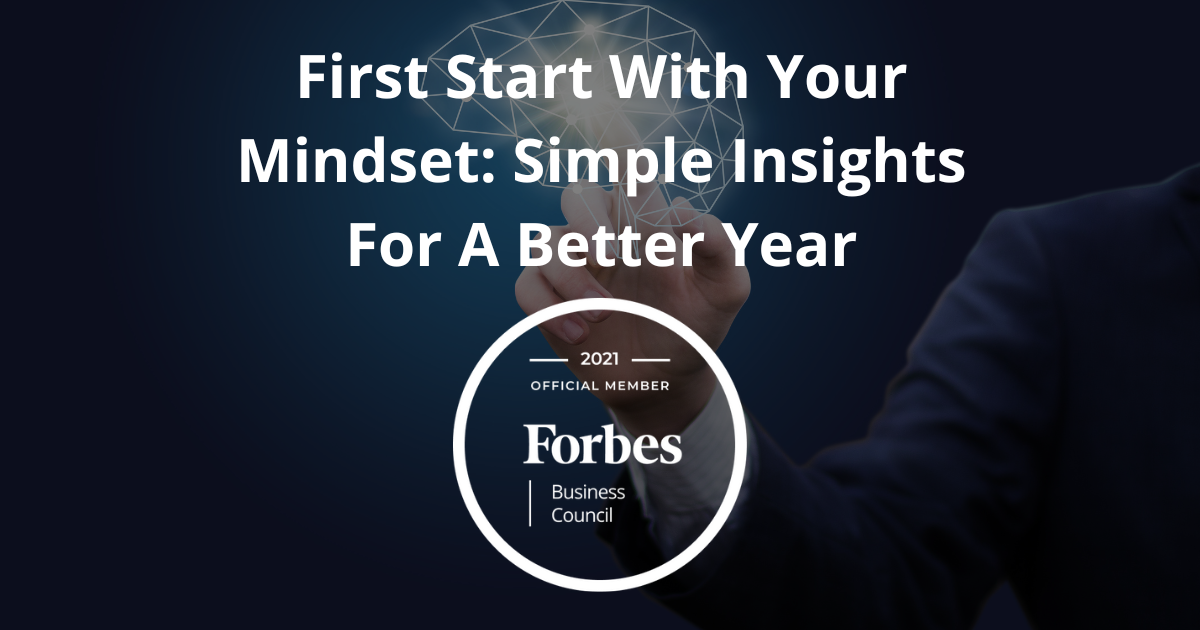No matter what stage you are at in your career, how you show up, manage your mood and articulate your needs can be a game changer. I have experienced the way in which one simple insight can help you navigate a brand new year with confidence and more grounding.
They don’t teach you this in college. They certainly don’t teach you that in your first 90 days. Mindset is rarely a conversation when you are promoted to a higher level in management. You often learn about it through mistakes, when someone points it out or through hit-and-miss practices.
Focusing On A New Mindset
The adversity that arose due to Covid-19 has massively affected companies around the globe, bringing along an overwhelming level of disruption and insecurity to all of us. But you now have a golden opportunity to turn negative narratives into new possibilities. The sense of overwhelm is real, and a change in mindset may drive the pendulum in your favor.
So, this year, commit to focusing on your mindset. The will for meaning and to belong can be the glue that holds people together. When we connect the dots to what matters, we start to hold conversations that are more intentional and purposeful.
The growing notion of quiet quitters has been the talk of managers and social media alike. This notion is not new. For years, managers shared frustrations with the next generation entering the block. A more helpful approach is to start with a shared belief that “we’re all in this together.”
Your challenging employees are not quitting; they are simply less invested in the idea of working to live. They are willing to quit rather than jeopardize their quality of life. They want to create boundaries around work-life balance. They resent overwork and prefer to avoid, or make little effort, to engage in activities that stretch their time beyond their work hours.
Knowing this might present a challenge for you. It can challenge your energy. How do you shift your mindset to be happier and more focused this year?
Ways To A Better Mindset
Consider these simple steps to help you lead through a more positive mindset.
1. Start with a check-in of your mood. Notice the energy you bring to your team. Explore how your mood impacts those around you. Does your mood support collaboration and forward-thinking? Does it burden your team, generate competition or create diversion?
Take a look in the mirror to keep your expressions and body language in check. Highly evolved leaders create a calm center for their teams to thrive. As an example of the effectiveness of body language, to enhance the mood of client support personnel, Nestle has a small mirror next to the laptops of customer representatives so they can adjust their smiles. Client satisfaction is found to increase (paywall) when employees smile while speaking on the phone with a client.
2. Meet them where they are. Learn about their highs and their lows. Ask them about workplace practices that can boost engagement and collaboration. Find ways to nurture personal connections. Stop and ask how they are doing. Find out what practices they desire to promote well-being. One of my clients has a mood-elevator check-in for his team meeting—where the team checks in on their mood level for the day. Acknowledging where we are is a segway to where we want to be.
3. Lead by example. Model the behaviors you want to promote in your team. Be the first to commit to and recognize commitment in your team. Hold yourself and your team accountable to higher standards of trust, collaboration and respect. Your team learns best when your actions align with your words. If you seek commitment from your team members, then be the first to commit.
4. Be proactive. Tackle pain points for you and your team. Compassion, empathy and collaboration will impact creativity. When asked what is the top leadership skill that impacts innovation, Satya Nadella, CEO of Microsoft, cited empathy as the most relevant skill for leaders to nurture innovation. Empathy means meeting people where they are; it does not mean accepting blanket excuses or avoiding difficult conversations. There’s room for us to be proactive.
Recognizing how your mood impacts your results can change your life. Your mood influences the well-being of your relationships at work and at home. Leading with positive energy can have a higher chance of increasing team synergy. When you manage yourself, you have a greater advantage in leading your team through change and disruption. We cannot control the next world crisis, but we can prepare ourselves to thrive during change.
Leverage your mindset to promote synergy and elevate your leadership capabilities. Bring a more proactive approach to leading others through positive energy, optimism and human-to-human connection.
It’s a brand new year. A fresh start. Highlight self-awareness in your map of the world and allow your intentions to set the journey for your leadership. Bring more intention into your workplace. The time to act is now.
This article was published on Forbes.com.

